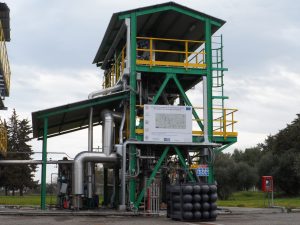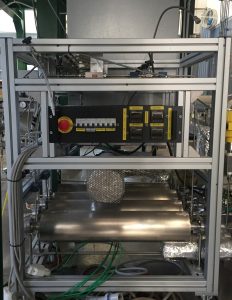ENEA Trisaia Bioenergy Up Draft Gasifier and Upgrading
TA58 – ENEA-PRAGUP
Location
SS IONICA 106
75026 ROTONDELLA, Italy

Description
The installation allows evaluation at a significant pilot scale of the gasification (20-30 kg/h as feed) and several downstream processes, like tar reduction, gas cleaning, and catalytic upgrading to produce clean syngas and pure hydrogen by Pd/Ag membrane reactors. The gasifier performance and the gas composition of the plant vary of feedstock specifications, biomass type and gasification medium. A major route to enhance the gasifier's flexibility is the use of oxygen-enriched air as a gasifying agent. The evaluation of process variables (temperatures, pressures, flow rate) and sampling systems allow a detailed characterisation of the gasification process. This can help in understanding the effect of the main operating parameters (feedstock, equivalence ratio, gasifying agent) and provide useful data. The experimental work is routinely coupled with modelling studies of the gasification process to estimate the effect of the main operating conditions and provide a theoretical basis for experimental results interpretation.
Testing Capabilities
The facility is of near commercial size but it can provide the required flexibility for testing, such as special feed and cleaning procedure under fully monitored conditions. These characteristics make it a rare facility in Europe for co-gasification of biomass as a virgin feedstock or residual.
Technical Equipment
Pilot Gasifier PRAGA (uPdRAft Gasifier) is a fully equipped gasification plant based on a 200 kWth updraft gasifier designed to test the co-gasification of biomass and sorted (plastic) MSW. The nominal input of the gasifier is 30-40 kg/h of feed with a maximum plastic content of 15%. The plant operates slightly above atmospheric conditions and uses a mix of air/steam as a gasification medium introduced under a moving grate at the bottom of the gasifier. The produced gas (roughly 80 Nm3/h) moves upward from the bottom of the gasifier while the biomass particles travel downwards progressively through zones of drying, pyrolysis, reduction and combustion.
The tar reforming section comprises a catalytic fixed bed operating between 400°C- 800 °C fed by the stream of syngas (1-5 Nm3/h) draft from the fixed bed at the variable height of the bed. Different catalysts can be tested in the reactor that is of modular design.
The gas cleaning section is composed by a biodiesel scrubber and two coalescer filters in series. By organic scrubbing, most of the organic and inorganic compounds (tars, HCl, etc.) are removed from the gas, while in the coalescer filters the oil drag particles are removed. This unit also allows a temperature reduction of the syngas coming out from the gasifier (about 300-400 °C). After the cleaning, the gas is destined to a flare or to a hydrogen enrichment section.
Two hydrogen enrichment sections are available. One is in train with the gas cleaning section of the gasifier and based on water gas shift (catalytic), while the other is mounted on a skid and is based on Pd/Ag membrane reactor that can treat up to 0.25 Nm3/h of syngas.
In addition to online gas chromatography, dedicated off-line GC MS is available. Tar are sampled after scrubber and coalescer filters for the offline analysis, both gravimetric and fine determination by GC-MS. In addition, a sampling probe has been developed on purpose to extract solid samples from the gasifier bed and evaluate the temperature inside the gasifier. The probe for sampling solid particles from the gasifier bed has been specifically designed to get information on the fate of the charring portion of second-generation biofuels (morphology, conversion, tar adsorption).
Additional information
Technology Readiness Level: 4-6
Special considerations: The visitors have to be covered by insurance from their organization
Technology clusters: Biofuels, Hydrogen, Materials for Energy
Website: https://www.trisaia.enea.it/laboratori-e-impianti.html
Availability: Excluded the months of August
Provision of tools to prepare data sets in a FAIR way: No

